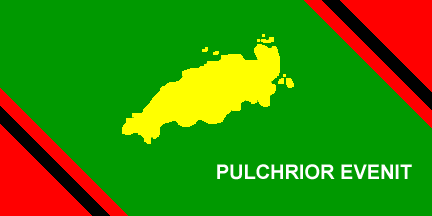
image by António Martins-Tuválkin, 1 April 2006

FOTW beschäftigt sich mit der Wissenschaft der Vexillologie (Flaggenkunde).
Alle auf dieser Website dargebotenen Abbildungen dienen ausschließlich der Informationsvermittlung im Sinne der Flaggenkunde.
Wir distanziert uns ausdrücklich von allen hierauf dargestellten Symbolen verfassungsfeindlicher Organisationen.
Last modified: 2021-08-25 by rob raeside
Keywords: trinidad | tobago | trinidad and tobago |
Links: FOTW homepage |
search |
disclaimer and copyright |
write us |
mirrors
See also:
Tobago was Dutch in 1632, in 1654-1683 it was a colony of Courland (now in northern Latvia) and in
1768 it was French.
Source: Dutch edition of "Westermann Grosser Atlas
zur Weltgeschiechte".
Mark Sensen, 31 August 1997
Tobago was under British administration after 1763 but was not
occupied by the British until 1797. Between 1763 and 1797 the
citizens (most of them were of Dutch origin) recognized the
British rule but had in fact a self administration. In 1814
Tobago was confirmed as Brtish colony by the Paris Treaty. It
remained a separate colony until 1888. The first reported badge
was after 1815. The first flag (a blue ensign with badge) was
used from 1877 to 1880. In 1880 a variant badge was reported in
use. After 1880 a new badge was included on the blue ensign.
After the union with Trinidad the badge became obsolete, but
remained in use. In 1889 a new variant badge was temporarily
reported. The badge of 1880-88 was in unofficial use until 1898
when a new constitution was granted to the colony of Trinidad
& Tobago.
Jaume Ollé, 28 August 1997
Tobago had its own badge from 1876 until 1889 before it was
joined with Trinidad.
David Prothero, 22 November 1999
Tobago passed into Dutch hands in 1632 and in 1654 was
colonised by Courland which abandoned it in 1683. It was
then occupied by France. Occupied by England (sic) in 1763,
it was abandoned. The French recolonized it again de facto
in 1768 but the British occupied it definitively in 1797,
converting it into a colony in 1814 when the cession was
confirmed by the Treaty of Paris. Tobago was a separate colony
until 1888 when it was joined to Trinidad. As a colony, it
used British ensigns with a badge.
Jaume Ollé and Stephan Hurford , 5 March 2000
Tobago used a circular seal in 1870 flag.
David Prothero, 8 April 2005
The motto "Pulchrior Evenit" is in Latin. In English
it means something like "she becomes more beautiful".
Dirk Schöberger, 17 November 2007

image by António Martins-Tuválkin, 1 April 2006
After many inquiries I found the Tobago flag (?). This is the text of the letter I received:
My name is Winston Murray. I teach at Morgan State University in Baltimore. Indeed I am the person who hoisted the Tobago flag with my colleagues: Mr Brassy, Mr Saul and Mr Bernard Romeo from Plymouth, Ms Moderine Alfred my house keeper from Bethel, where the flag was designed by Ms Claudia n?e Callender. The flag was hoisted on December 31, 1977 with the assistance of ex-soldier Hubert Hackett of Campbleton, Tobago. The political party is called the Fargo House Movement. The name Fargo is the alias appended to the name of our first parliamentarian Alphonso Philbert Theophilus "Fargo" James. The colours of the Tobago flag are black, green and red.
Now it's necesary to find out if the stripes are horizontal or vertical.
Jaume Ollé, 8 January 1998
For some years that has existed a pro-independence movement on
the island which uses a distinct flag. The Indeendentist flag was
first raised on 31 December 1977 by Winston Murray, George
Joseph, alias jango, Charles des Vignes, and former soldier
Hubert Hackett of Campbleton, Mr Renal Brassy, Mr Saul and
Mr Bernard Romeo of Plymouth,and Ms Moderine Alfred de Bethel (Mr
Murray's Housekeeper). The flag was designed in Bethel by
Ms Claudia (Claudette Hector Daniel) nee Callender.
Pro-independence feelings are represented by the Fargo House
Movement. The name Fargo was the alias of Tobago's first
parliamentarian Alphonso Philbert Theophilus "Fargo"
James. Red is the blood in the slaves' struggle for the island
Green is Nature Black is the country, Tobago. The motto
"Pulchrior Evenit" may be translated into English as
"she becomes more beautiful" or into Spanish as
"Ma's Embellece"
Jaume Ollé , Stephan Hurford and Santiago
Dotor, 5 March 2000
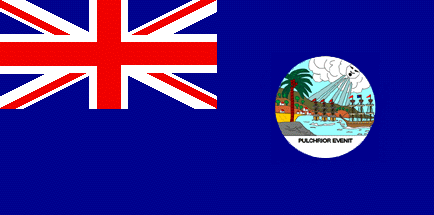
image by Jaume Ollé , 5 March 2000
to-b1.gif)
image by Jaume Ollé , 5 March 2000
The first badge. known since 1815, was used in the flag from
1877 to 1880.
Jaume Ollé and Stephan Hurford, 5 March 2000
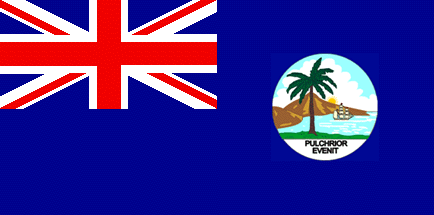
image by Jaume Ollé, 5 March 2000
to-b2.gif)
image by Jaume Ollé, 5 March 2000
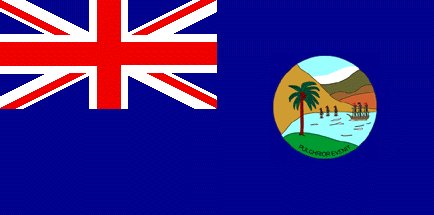
Variant Flag c. 1880
image by Jaume Ollé, 5 March 2000
to-b3.gif)
Variant Badge c. 1880
image by Jaume Ollé, 5 March 2000
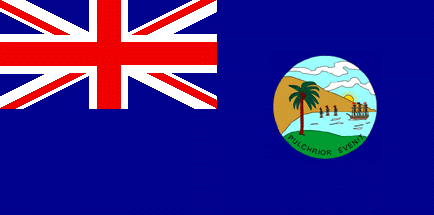
image by Jaume Ollé, 5 March 2000
to-b4.gif)
image by Jaume Ollé, 5 March 2000
Tobago was administered as part of the Windward Islands from 1833 until 1889 when it was annexed to Trinidad.
Here are two versions of the flag badge approved in 1870 which
was a circular "local scene" taken from the Seal of the
colony.
The illustration on plate 18 of the 1889 Admiralty Flag Book is
different in some details. I'm sure that they are all meant to be
illustrations of the same badge; essentially ship/ships in a bay,
land-locked to the left with a palm tree at the left of the badge
and the sun above a headland in the background.
The badge was probably used on the UJ as well as the Blue Ensign
since the Windward Island badge, as such, was not introduced
until 1886/7.
David Prothero , 25 Febuary 2000
Hosted by: Fanshop-Online.de und Handy-Shop.de
Tipp: Apple iPhone 12 im Shop